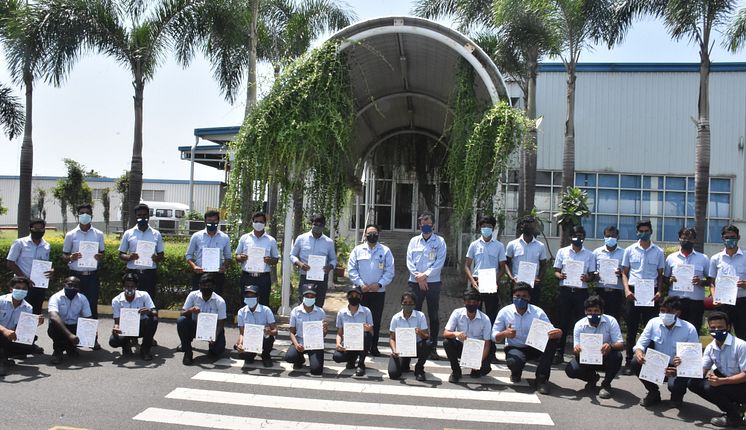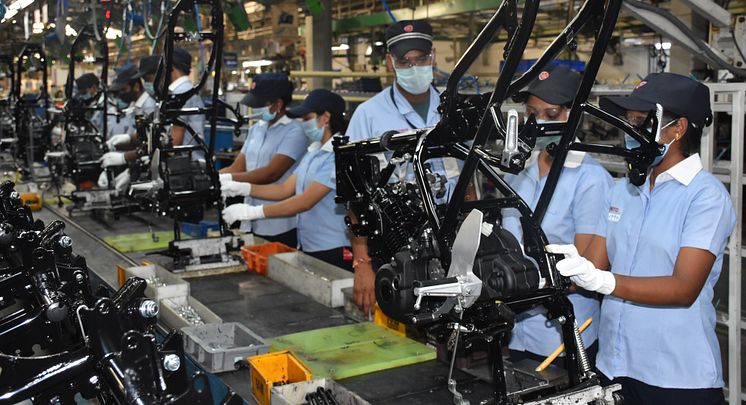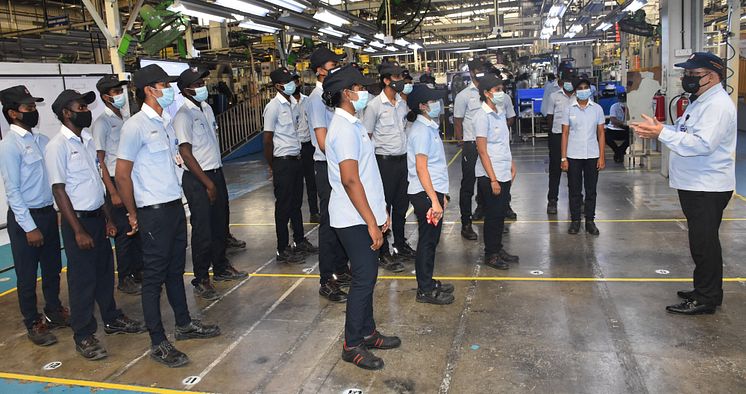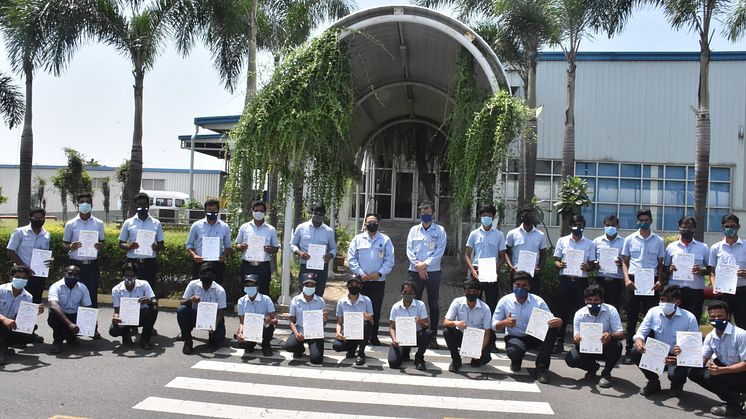
News -
Opening the Door to the Factory Floor Yamaha Motor Newsletter (Sept. 24, 2021 No. 91)
India boasts the largest market for motorcycles in the world and is widely known as the second most populous nation. However, over 40% of the country’s 1.3 billion citizens are younger than 25 and youths often face a difficult journey to adulthood, with unemployment for those aged 15 to 24 sitting above 20% (figures from the The World Factbook).
As part of the Skill India program initiated by the government in 2015, Yamaha Motor was the first company to open the Yamaha Motor NTTF Training Center in 2017 as a designated Japan–India Institute for Manufacturing, with a four-year comprehensive curriculum to train and educate young Indians in Japanese-style manufacturing ideals and methods.
In this issue, we introduce the background to the program and how it has changed the lives of its first-ever batch of graduates.
Offering New Opportunities to the Youth of India
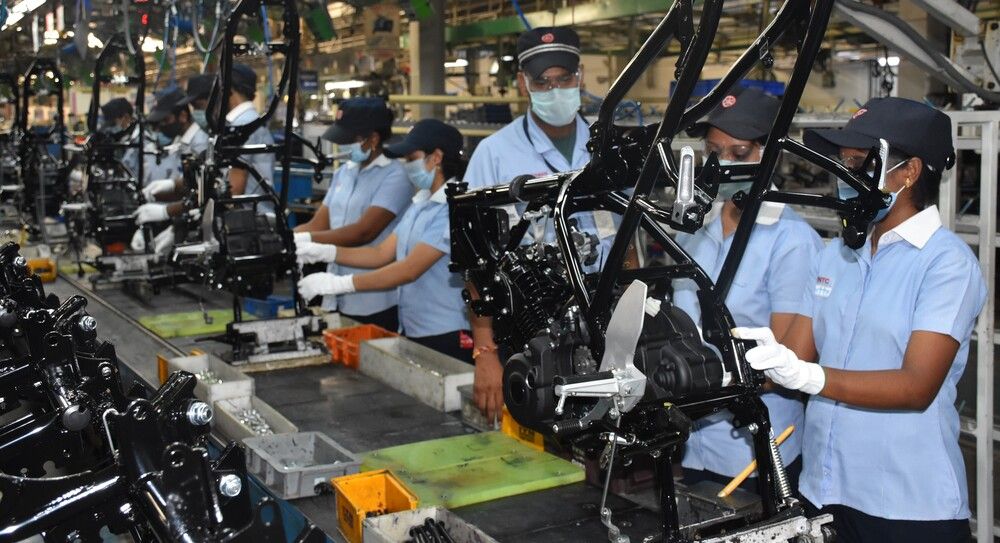
In India, Yamaha Motor has long engaged in community outreach through exclusive programs to take in those from challenging economic backgrounds and offer them training and education to secure a future for them and their families. Yamaha Training Schools throughout India are one example, training the financially unfortunate to become Yamaha-certified motorcycle mechanics and giving them employment in Yamaha dealerships.
However, the Skill India campaign launched in 2015 by the prime minister became the impetus to bring in and train people with zero engineering or technical background from very rural areas in Japanese-style factory operations. Yamaha Motor partnered with the Nettur Technical Training Foundation (NTTF) in putting together its program and opened the Yamaha Motor NTTF Training Center in 2017. NTTF is responsible for the classroom-based technical training while Yamaha handles the on-the-job training side at its Chennai plant in India’s southeastern state of Tamil Nadu. The education is thorough, comprehensive, and largely based on Yamaha Motor’s Monozukuri principles. Some 80% of the students’ time per week is dedicated to hands-on training at Yamaha while the remaining 20% is in a classroom setting by NTTF, which not only provides math, physics, and chemistry lessons but also helps them adjust to a new lifestyle.
“This classroom curriculum is as good as a vocational college curriculum,” explains Ajay Mahajan, Vice President of the Chennai Factory. “Once they graduate, their certification is on-par with an institute-issued diploma qualification, and this is recognized nationally by the government.” Yamaha’s program was incredibly well-received, with nearly 200 people applying for the program’s first class of students. Mahajan also notes that every woman who applied was accepted after due consideration, not to meet a quota, but to raise the level representation of women in the manufacturing industry. But he also points out that narrowing down some 200 people to a small batch of 40 also presented the toughest challenge for the team.
Changing Lives with Yamaha Motor Monozukuri
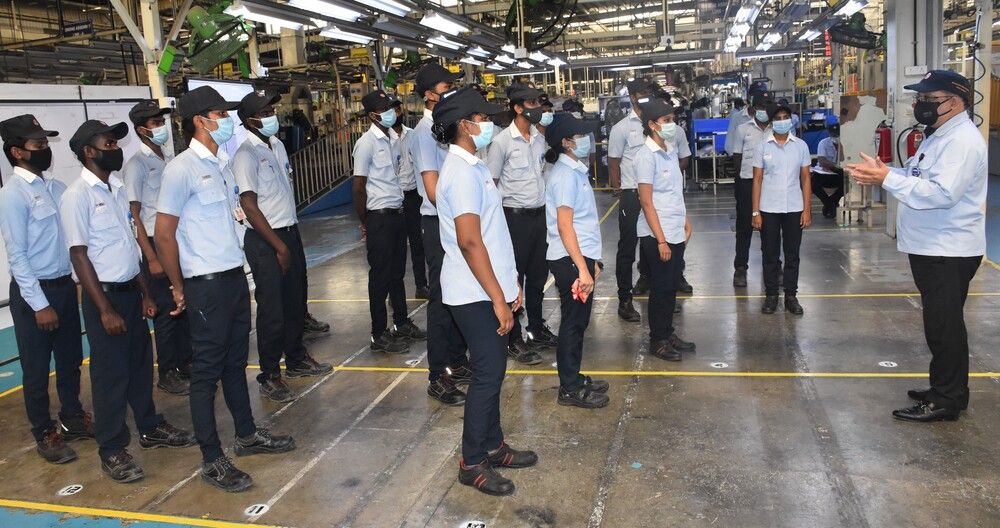
“Everyone that applies comes with needs attached and it’s very difficult when they do not see their name on the admitted list, because they came with a lot of hope. They see Yamaha as a company serving the needs of society and this as a great opportunity for their future,” Mahajan admits.
For those that were selected, lessons at the factory begin with the basics, such as safety, quality, production systems, schematics, and the like. With each six-month semester, the students rotate around the factory, gaining exposure to all Yamaha’s manufacturing operations—from welding, painting, and casting to machining, quality checks, and final inspection—to keep things fresh and stimulating. This keeps them involved and their desire to learn strong. The aforementioned 80-20 ratio was decided on to give students a better understanding how manufacturing improvements are made and more hands-on experience, something Mahajan says they find much more enjoyable than the classroom!
“New students are just like clay. In order to make sure that clay is moldable, we have to work that clay to the right softness, through personality development, discipline, teaching them English so that they can be employed anywhere in the country or continue on to higher education if they want. As experts in the industry, we have the know-how to mold that clay and because they have no industry background, they are all clean slates. So whatever we teach them, they will learn and what becomes important is how enjoyable we make that process.”
It was not all smooth sailing; of the original entrants, 27 successfully made it through to graduation. Some were unable to continue due to personal health or family circumstances, but others had discipline problems that could not be ignored. The second batch of graduates was even smaller as many opted out with the COVID-19 pandemic. But Mahajan sees these as areas for possible improvement: “This is a first try for us as well and we’re learning every year. We are analyzing the backgrounds and demographics of the students that tend to stick with us for the full four years and we will perhaps focus our future applicant selection on those demonstrating these traits.”
The four-year curriculum is rigorous and learning Japanese business practices like 5S (seiri, seiton, seiso, seiketsu, shitsuke), Ho-Ren-So, and kaizen in addition to engineering sciences and industrial standards requires dedication and motivation. This is part of why the “Learn and Earn” scheme was put into place by Yamaha. The stipend provided is not just a motivator; it gives them pride in their work, their personal development, and helps them support their families. It also represents the small but undeniable contribution they have made to Yamaha over the time they spend on the factory floor.
“When we talk to them after four years and see what they were like at first, their personalities have completely changed,” explains Mahajan. “The way they behave, the way they talk, their respect for others have all changed and their commitment to forging a life for themselves has changed. In the beginning they were raw clay, but we have now shaped them into a vessel. They still need 3–4-year ‘curing’ process, though, after which they will be very capable leaders on the floor.”
True to his word, there is a roadmap in place to take this very first class of graduates into the fold at Yamaha in India as dedicated trainees and begin their “curing process” by taking their technical and managerial education further, and gradually transforming that once-raw clay into complete and polished pieces.
|
Comments from the Yamaha Motor NTTF Training Center’s Class of 2021 ・This training improved my discipline, punctuality, and my knowledge and skills with industrial rules and regulation. ・I learned about the Japanese Yamaha culture, which is about living your life with discipline and respect. ・The training helped me improve my attitude and I learned to approach work in a more strategic and planned manner. ・The Learn and Earn course really helped my family to improve financially. ・This was my first experience in the industry. Before joining, I didn’t know how the manufacturing industry functions, but today I have a very deep understanding of it. ・Before joining, I had no idea about operating machines, but now I have gained the knowledge and the right set of skills to operate them safely. ・The subjects are related to the factory floor so it’s easy to learn about the Japanese work culture and Yamaha standards. ・After graduation, I want to continue improving my knowledge and skills. I hope to work with a company like Yamaha. |
|
Message from the Editor Ajay mentioned that the program’s first batch of graduates will be receiving offers to work at Yamaha, and he hopes that since the company has trained them in its ways and given them a solid foundation in Yamaha’s Monozukuri, they will go on to become future factory leaders. Hearing that made me so proud of the progress they have made, and I hope the program and the amazing work Ajay and the rest of the team in India do leads to even greater success. Maiko Kawai |
